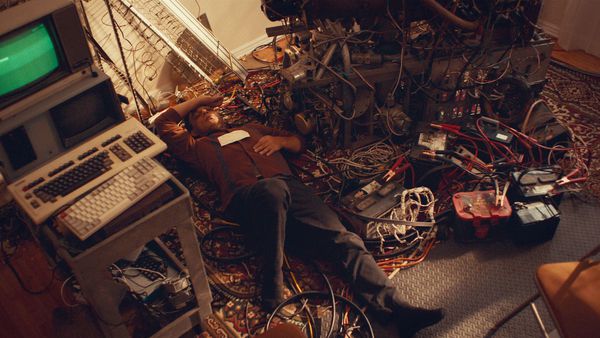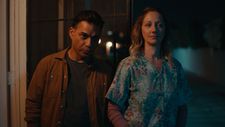 |
| Aporia Photo: courtesy of WellGoUSA |
A smart independent science fiction film with a fresh approach to meddling with time, Jared Moshé’s Aporia didn’t have the glamour of some of this year’s other Fantasia films, but stood out nonetheless because of its combination of a clever plot and sensitive, finely tuned performances. It focuses on a bereaved mother, Sophie (played by Judy Greer), who gets a new lease on life when her old friend Jabir (Payman Maadi) reveals a machine which he and her deceased husband Mal (Edi Gathegi) were working on prior to the fatal car crash. With it, she could change what happened to him – at the cost of another man’s life. Though she struggles at first, it’s not a difficult decision – but what happens afterwards opens up a much more complex narrative about grief and the importance of learning to live with vulnerability.
Jared is better known for his westerns, so when we met during the festival, I began by asking him what drew him to this particular area of science fiction.
“It came from two places,” he explains. “The first is this idea I just randomly had: what if there was a gun that could fire a bullet into the past? I had thought about that idea and I just didn't know what to do with it because it felt too big. And then I recently became a dad, and suddenly that experience made the world feel a lot scarier and a lot more uncertain. The idea behind it was like, alright, what if it is a parent trying to fight that uncertainty? Like, ‘How can I try to control it? How can I create a safe environment for my family, something I can control and understand?’ And I realised, okay, maybe I can use that random, weird idea as a way to tell this story about a woman wrestling against uncertainty and trying to regain her family.”
 |
| Edi Gathegi and Judy Greer in Aporia Photo: courtesy of WellGoUSA |
It’s something I find interesting, I say, because people can think that they have a very clear sense of morality and then when they become parents they experience a sudden shift iin priorities which makes that much harder to hold onto. I’m interested in the ways in which Sophie tries to justify to herself things which she’s already decided to do regardless.
“Yeah, I was interested in the way her morality shifts. I think that there isn't really a clear morality, so to speak. Even when you want to do the right thing for your family, it might mean doing the wrong thing for the world. There's no easy answers in it. And I think it was really important to show her wrestling with the morality of it and this idea that, at the end of the day, she wants everyone to be okay, like, she wants everyone to be happy. She's striving for that. At some point you just understand that you can't do that. You have to accept that the world is uncontrollable, and uncertainty is a way of life.”
It's always difficult with a time travel story, which effectively this is, to keep it grounded, and to keep a clear through line. How did he set up the rules for this?
“I wanted to have very clear and simple rules that were easily understandable. One, the machine can only kill. Two, changes are permanent, you can't unkill someone. And three, once you use the machine, you remember the original timeline, not the new one created. So we had those clear three rules, and then we wanted to have the realities really mapped out and understand what the changes to the their emotional states were and how the different realities would change the world around them.
“When we were shooting the film, we scheduled it around one reality. We shot one section, one reality, then the next section, the next one, and so forth, which meant that the actors and everyone could understand emotionally where they were. Also, you know, it allowed for production design to help plan out how things were going to change and make sure everything was really thought through for who was who. Every choice was made as though it came from the characters.
“Once we had those things worked out, it was easy, at least for me, to keep track of everything. I was the person on set who said ‘Alright, this is what's this reality.’ They could come to me at any moment and I could easily tell them what world we were in and what the reality was, what a character was remembering, what the space was. It was very important to have all that straight.”
We discuss production design; I mention that my father was a research physicist and that the messy construction of the machine felt very familiar to me. It also reminded me of Primer.
 |
| Edi Gathegi and Payman Maadi in Aporia Photo: courtesy of WellGoUSA |
“Sure, Primer was a reference, 100%. That was one of our key references. But those two guys are scientists in Primer. They work in a lab, so they understand technology in a certain way. I wanted this machine to feel like it was built by the people you'd least expect to build it, that the most powerful, crazy machine in the world was in a building you wouldn't give a second look to. And I wanted it to feel like, alright, Jabir and Mal had a really great understanding of physics and science and theory and so forth, but they didn't have resources.
“They had to figure out how to build this machine with junk they scraped together on the streets or picked up from metal scrappers or ripped out of an old fridge. We had two production designers on the movie. One was Kati Simon, who handled the realities of the world and everything, and there was Ariel Vida, who did the machine. My big direction to Ariel was ‘Make it feel like it's a fire hazard. This thing has caught on fire 100 times. It’s more likely to burn down the building than it is to actually work.’
“If science is trial and error, them building this machine was trial and error. Like, they built something, it didn't do anything, they turned it on and started a fire. They don't actually know what actually works and what doesn't, and there's this mess of wires and pieces and parts that could be doing absolutely nothing, they don't really know.”
There’s also a moment in there when Mal toys with the idea of publishing a paper about the discovery, and the thought of that technology being weaponised by others, even nation states, is a whole other level of terror.
“It's supposed to be,” he nods. “I think it's interesting to show that Mal is a character who seeks recognition. He had this dream of being this big scientist who was going to make rockets to Mars, and that got taken away from him. And so there's this sense that he just wants to be recognised for his work, and it's really important for him.
“I think there is a moment when you create something where your selfish desire for that comes through a little bit more. And I want it to feel scary, a little bit, like, could we go this way? What's going to happen if this machine got out into the world? You know, I think Mal probably at some point realises this is probably not a good idea. But you know, at that moment he's so excited and he's such an idealist. He just wants it to be out there, for people to understand what he created.”
Jabir seems to have a much clearer understanding of who he is and what he wants. Was there always an intention to balance those two different characters?
 |
| Payman Maadi and Judy Greer in Aporia Photo: courtesy of WellGoUSA |
“Yes,” he says. “To me, it was really important that there wasn't a villain in this movie. It's very easy, when you have three people, to turn two against one one against two, and make one of them into the villain. I wanted everyone to have a very clear point of view and an emotional relationship to the machine and desires that the audience can relate to. And Jabir, to me, has a very clear through line. He wants to save his family and he's willing to do whatever he can for that.
“I think, because he's probably been wrestling with this longer than any character, he understands the moral cost of it and is more willing to accept it than they are. But his story turns out to be pretty bittersweet. One of the reasons we cast Payman Maadi in that role is because he is such a rich actor, who can mine emotion from the smallest story. He's an actor who can sell it. This is a scientist, but also someone who can sell the human side of it in a really deep, emotional way.”
It's also an interesting performance in contrast to Judy Greer’s, because she has so much big emotion to cope with.
“Judy and I sat down with a script and went through a page by page just talking through the emotions she was feeling. She has so many different conflicting emotions in every scene, and figuring out what was dominating at that moment, and having a really clear understanding of where she was emotionally in each scene and each beat and each line, so that the character on the day felt emotionally true to both of us.
“One of the things I love about Judy is that she's such an expressive actor, she can show so much emotion, and shift between emotions so quickly on her face. That's often been used for comedy, and that's why she's had such a great comedic career. I was really excited about the possibility of using it for drama, as she's wrestling with all the conflicting emotions she's had, making it feel very human and true and subtle, rather than just big and expressive.
“We cast Judy first, and then once we had Judy on board, it was important to me to have a Mal who brought stillness to the role. And I'd always been very impressed with Edi Gathegi because he’s very still and very steady in his performances, but brings so much with his eyes. That, to me, felt very true to the Mal on the page, so we cast him for it.
“After we cast them together we had a dinner and we got them to know each other, just to create connections between them. In a dream world, we would have done a Blue Valentine, where they lived together for a month, but unfortunately we didn't have the budget or time to do that. But the first scene we shot with them together was their first scene in the movie, so we could get the chemistry and give them space to play and really feel connected to each other.
 |
| Aporia Photo: courtesy of WellGoUSA |
“A lot of the grief stuff that's at the beginning of the movie was shot at the end of the movie. So Judy and Edi were together for most of the movie, and then suddenly he goes, and she's alone. She’s kind of lost her partner in the movie. That gave her something to work with.”
It's a very small, intimate film, and it’s also a relatively low budget film, for all that it has some very big ideas in it. Did he ever imagine that it would get him to festivals like Fantasia?
“I hoped so.” He smiles. “I mean, I knew that it was really important to me to connect, that I wanted to get this out to the audience. And we got WellGo interested. WellGoUSA is releasing the film in the US, so we knew we had a really good partner who would support the film and get it to audiences. And then Fantasia – it has just been a joy to be here.”
He doesn’t know what he’ll be doing next, he says, because everything is complicated by the writers’ strike and the actors’ strike. He makes it clear that he supports their cause. There is an independent science fiction project, however, which he hopes to get off the ground soon – something for fans of Aporia to look forward to.
Aporia is in US cinemas from 11 August.





















